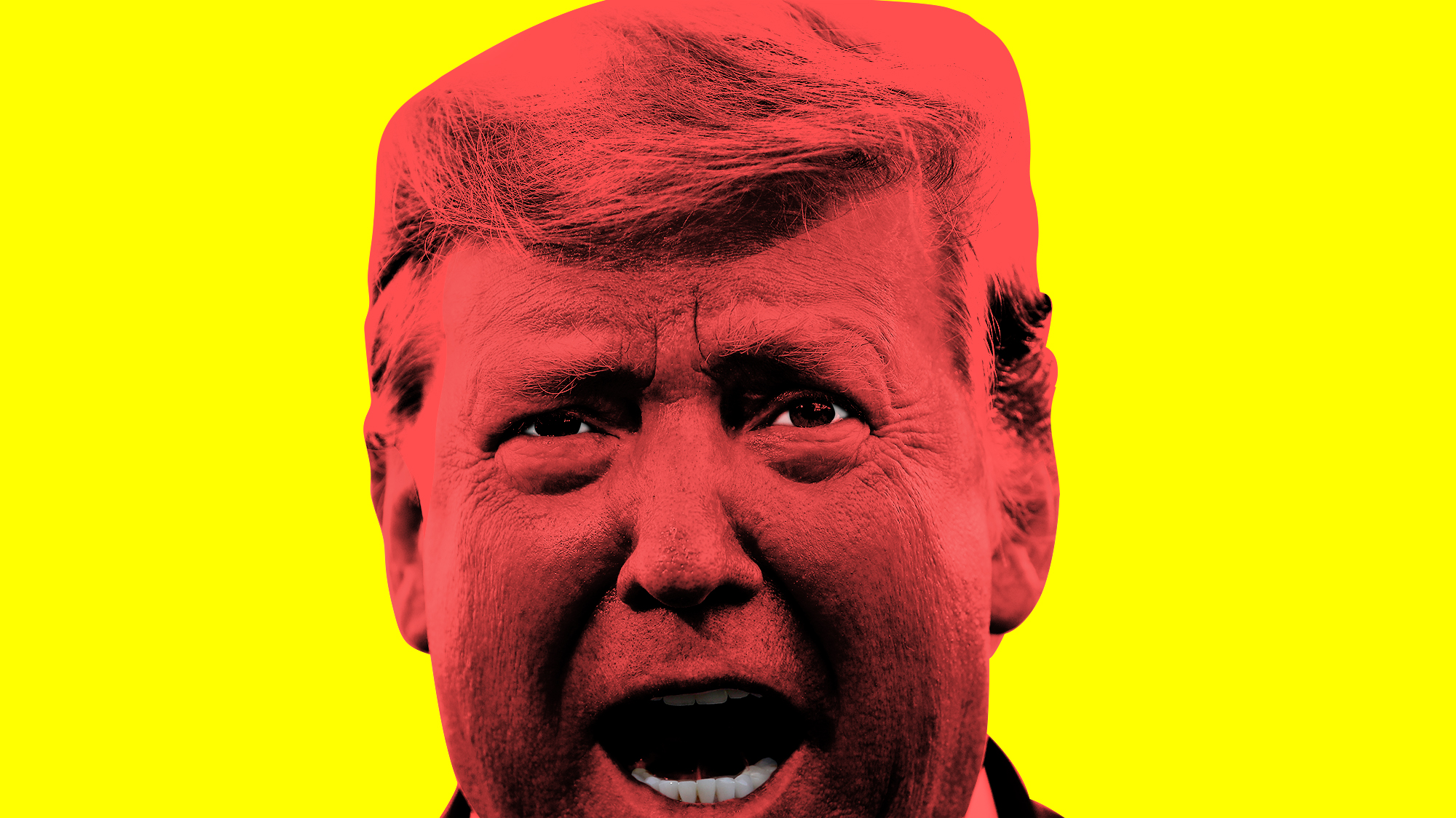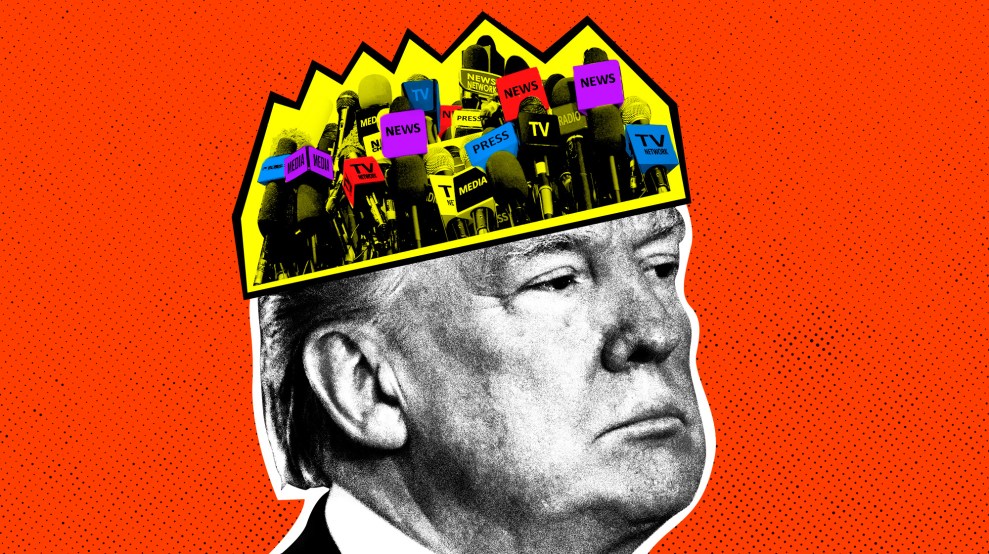From the day Donald Trump assumed the presidency, it’s been clear that he planned to burn it down. Not the office itself, but the system on which it is built: the credibility of the electoral system by which that formidable power is attained. The norms, customs, and processes that constrain it. And, perhaps most importantly, the idea that the people who bestow that power are entitled to know how it is being used.
The impeachment fight goes to the heart of this last point—the same point that’s also the core of what we are about as journalists, and what you are about as people engaged with our democracy. So we wanted to take a step back and look at the big picture of what this growing constitutional crisis means, and how we at Mother Jones should think about our work in this context.
Politicians who lie, obfuscate, or dodge the rules for strategic reasons are nothing new for us, or for you. (Our Washington bureau chief, David Corn, literally wrote the book—okay, a book—on this.) But Trump is a different story. Not only does he crash through the guardrails of law and common sense, he may no longer understand what they are. As David pointed out recently, the most telling part of the infamous call with the Ukrainian president came when Trump demanded that Volodymyr Zelensky look into an utterly bizarre conspiracy theory that holds that Russia did not hack the DNC’s servers. David wrote:
It’s easy to dismiss Trump’s BS as, well, just BS. After all, Trump will publicly say anything to escape responsibility, change the subject, or cover up misconduct…But when he was speaking to Zelensky, he was not in front of an audience. In private, he was expressing a priority and making a specific ask (or demand). And that [request] focused on Zelensky producing information to confirm an utterly batty idea.
Trump regards this absurd idea as true. Why? Because he wants to. Because he needs it to be real. Because he does not care about reality. It was one thing for Trump to push Zelensky to come up with muck on Joe Biden and his son. That sort of material was within the realm of possibility (and it could probably be made up, if it doesn’t exist). But to concentrate on the servers conspiracy theory? This transcript shows that Trump is a prisoner of his own self-deception, a man untethered from the world of facts. It might be more reassuring if he was only an inveterate liar.
The problem, in other words, is not just a president who will say and do anything that seems advantageous to him regardless of truth, decency, or the constitutional order. It’s a president who may no longer understand that these things exist.
And this is a problem that the systems we’ve relied on to constrain the powerful are not designed for.
The last couple of weeks have shown that accountability is far from assured for a president who considers himself unbound by the rules. Consider that the story of that phone call almost didn’t come out: The intelligence officer we know as the first whistleblower notified the top lawyer at the CIA, who called the White House, which (having already stashed the call records in a superclassified system) did nothing. Then, when the whistleblower filed a formal complaint, the CIA notified William Barr’s Justice Department, which…did nothing. The House Intelligence Committee was only informed that a whistleblower complaint existed, but was not told of its content. Can you imagine what would have happened 10 months ago, when the committee was led by Republican Devin Nunes?
The whistleblower system is designed to alert the top brass to abuses inside the bureaucracy. But what happens when the top brass are themselves the wrongdoers?
Trump is demonstrating the answer right now. The White House’s letter refusing to cooperate with the investigation does not evade, spin, or play for time. It spits and shouts and declares the probe itself an outrage. This is the Brett Kavanaugh playbook amplified 1,000 percent: It’s not about trying to put the best face on the facts. The search for facts itself is being delegitimized and turned into a culture war battleground. And the proper response, according to Trump and his echo chamber, is not disagreement or debate, but war.
That declaration of war dramatically ramps up the stakes for the other institutions of accountability. We already know where Trump’s partisans in the House and Senate stand: Most have followed him around the bend. Democrats are turning to the courts, but that system, too, may not be ideally designed to examine misconduct at the very top: Many of the judges who will decide these matters have been appointed by the man being investigated. As Mother Jones’ Pema Levy reported the other day, Trump, in defying Congress’ requests for information, can either run out the clock with legal maneuvers or push all the way to the Supreme Court, whose conservative majority he cemented by choosing two judges who share an expansive view of executive power.
And what of the media? Journalism can serve as an outside watchdog and outlet for whistleblowers. But Trump, as we know, has declared war on the press as well, escalating from “fake news” rhetoric to calling journalists “corrupt,” “sick,” and “Radical Left.”
Trump’s war on the press also helps him leverage the Fourth Estate’s weakest spot: The allegiance to the view from nowhere and the idea that for every scandal on “one side,” there is always an equal and equivalent one on the other. This is what gave us wall-to-wall “but her emails” coverage in 2016, and what in 2020 will generate endless hand wringing over non-stories while Trump’s associates are given carte blanche to lie on national television. (And the financial imperatives that drive television, in particular, toward Trump’s equivalent of a NASCAR race, where you watch for the crash, are only more acute at a time when the business of news is falling apart.)
That’s all pretty grim. But here is the flip side.
Trump is going ballistic because the walls are closing in. Even Fox News’ polling finds that more than half of voters support the impeachment inquiry—and a Washington Post poll finds a quarter of Republicans and right-leaning independents back it too. A growing number of people trust the media to tell the truth more so than they do Donald Trump. In court, some of his claims that he is above the law are getting pulverized. And the revelations have only just begun. (One of the things you learn as an investigative reporter is that where there is one whistleblower, there are always more.)
For the facts to come out, journalism must remain steadfast and keep digging. Trump knows his biggest enemy is not the media: It’s the truth. We’re seeing that when his misdeeds are revealed, he is forced to increase his lying, spinning, and gaslighting—to the point where it may no longer work even for him.
There are documents waiting to be uncovered, whistleblowers waiting to step forward, dots to be connected. And as a Mother Jones reader, you know that this is what our newsroom is built to do. Our purpose is to expose those who abuse power, in government or outside. Our reporters go to work every day to uncover the truth. They meet with reluctant sources. They file Freedom of Information Act requests. They read through piles of documents and dig through remote corners of the web to chase after the stories others won’t. And week after week, month after month, they get the kinds of stories that someone is trying to hide.
And yes, we have to fundraise for this work pretty much all the time, because there are no fairy godmothers or fancy-brand advertisers underwriting this kind of journalism. There are only readers. You.
We don’t know how this will all turn out. But we do know that more sunlight, more exposure, more disclosures always makes it harder for wrongdoings to escape accountability forever. At Mother Jones, for years we have been doing all we can to serve the truth—to uncover the stories that others miss, discount, or ignore, to keep a harsh light trained on those in power. We’re a little exhausted, just as you are. But just like you, we realize it is time to shift up a gear and keep going strong.
If you can help us do it—because the only people who will pay for this kind of journalism are readers like you—your donation of any amount will be doubled as part of our huge Moment for Mother Jones campaign. And it will be a powerful signal that during this critical moment for our democracy, you came down on the side of truth and transparency.
Our pledge to you is to provide the hard-hitting journalism this pivotal time demands. We know how to do it. And we know you have our back.












